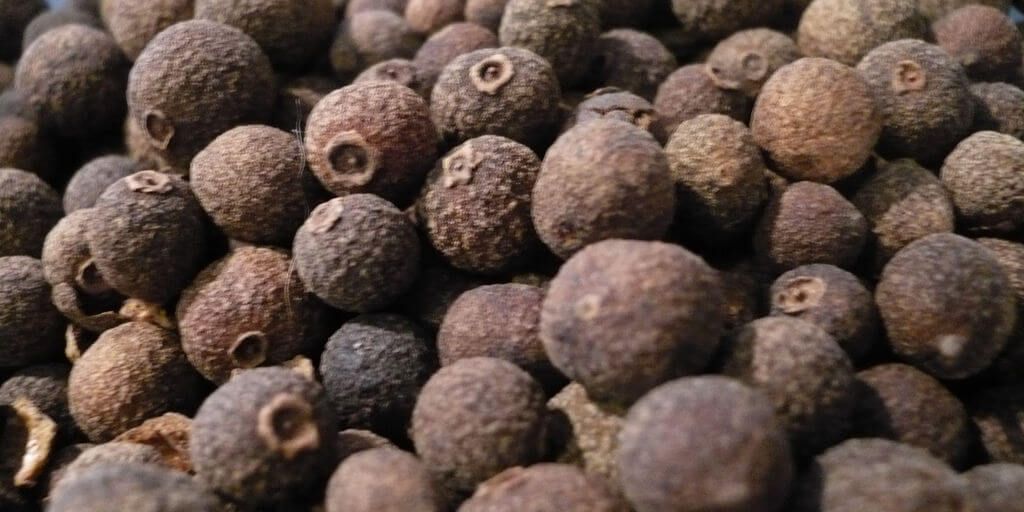Allspice, (Pimenta dioica), also known as Pimento, is the dried berry of the Pimenta dioica, a tropical evergreen tree of the Myrtaceae family that grows from 22 – 43 feet high on the average. The pimento tree is native to the West Indies, the Caribbean Islands, Central and South America and Mexico. It is grown commercially in Jamaica, Mexico, Trinidad, Cuba and Honduras.
The Pimenta Tree
The shrubby, slow-growing pimenta has glossy leaves that are leathery and elliptical-shaped; and the aromatic tree produces small, white blooms in the spring and summer; followed by clusters of pea-sized brownish green, spicy berries in the fall. The immature berries are dried and ground to produce allspice. Allspice was named due to its scent, which is a combination of cinnamon, nutmeg and cloves.
History of Allspice
Pimenta was given its name by Spanish and Portuguese explorers, who thought the dried berries looked like peppercorns, and called them “pimenta”, or pepper. The leaves, berries, and oil are used, not only for health and medicinal purposes, but also for spices, flavoring and fragrance.
The wood of the tree was also used to make aromatic walking sticks and umbrellas in the 1800’s, leading to over-harvesting followed by strict controls to prevent extinction.
Active Ingredients in Allspice
Allspice extracts have antioxidant, antiseptic and anesthetic properties.
Allspice is a natural source of; beta-carotene, vitamin A, vitamin B1 and B2, vitamin C, niacin, thiamine, and riboflavin; along with the minerals; iron, potassium, magnesium, selenium and manganese.
Its active elements are; methyl eugenol and caryophyllene, resin, tannin, sugar, quercetin, glycosides and sesquiterpenes; and it contains metabolites of homovanillic and homomandelic acids, malic and gallic acids, lignin and bonastre.
Another active constituent is the phenol eugenol, which is used by dentists as an antiseptic and a local anesthetic for teeth.
Allspice Health Benefits
Allspice has been used as a natural herbal remedy for; fever, colds, flu, diabetes, menstrual cramps and heavy menstrual bleeding, and fighting yeast and fungal infections.
Allspice is widely used as a carminative, to prevent or relieve flatulence. It is used as both an aromatic stimulant and as a tonic for the gastrointestinal tract and digestive system, to treat vomiting, stomach ache, diarrhea and indigestion; along with digestive disorders such as dyspepsia and colic. It is also i known to improve the appetite.
The essential oil in Allspice is a tonic for the nervous system, and has been used to treat nervous exhaustion, hysterical paroxysms, neuralgia and convulsions.
When used externally, Allspice warming effects are used to relieve chest infections, arthritis and rheumatism, bruises, and muscle aches and pains.
How to Take Allspice
Below we will explore the different ways to use Allspice:
Allspice to Soothe Indigestion
Make an infusion of 1 – 2 teaspoons of Allspice powder in one cup of boiling water. After steeping for 15 minutes, strain through a coffee filter. May drink up to 3 cups per day.
Allspice for Joint Pain
To relieve muscle aches and pains, joint pain and arthritis, and to treat bruises: Make a poultice using Allspice powder mixed with enough water to make a paste. Spread the paste on a clean cloth, and then cover the affected area.
Allspice as a Dietary Supplement
Take 1 – 2 capsules with water at meal time; twice a day. Capsules average 600 mg allspice powder.
Latin Name
Pimenta dioica
Common Names
Allspice, Jamaica pepper, clove pepper, myrtle pepper, pimenta, turkish Yenibahar, pimento, newspice.
Properties of Allspice
Carminative, anti-diarrheal, rubefacient, aromatic, digestive stimulant, digestive tonic, antioxidant, antiseptic, anesthetic, analgesic, anti-dontalgic, anti-fungal, nervous system stimulant, antidepressant, aphrodisiac, tonic.
Allspice is indicated for:
Flatulence, stomach ache, colic, diarrhea, vomiting, indigestion, dyspepsia, poor appetite, aromatic, fatigue, nervous exhaustion, hysterical paroxysm, depression, neuralgia, convulsions, menstrual cramping, heavy menstrual bleeding, fever, colds, flu, chest infections, arthritis, rheumatism, muscle aches and pains, joint soreness and pains, bruises, diabetes, yeast infections, fungal infections, tooth and gum pain.
Shopping
| Visit the new SHOPPING page for a wide selection of amazing products! |
Always take care when taking herbs and Read Our Disclaimer.
Allspice Herb Notes / Side Effects
Allspice and its extracts can be irritating to the mucous membranes. Consuming more than 5 ml of the essential oil may cause toxicity such as nausea, vomiting, central nervous system depression and/or convulsions. Allspice should be avoided during pregnancy and while breastfeeding. It is contraindicated for those with cancer or at high risk for cancer, and for chronic gastrointestinal conditions such as reflux disease, duodenal ulcers, diverticulitis and colitis.



Leave a Reply